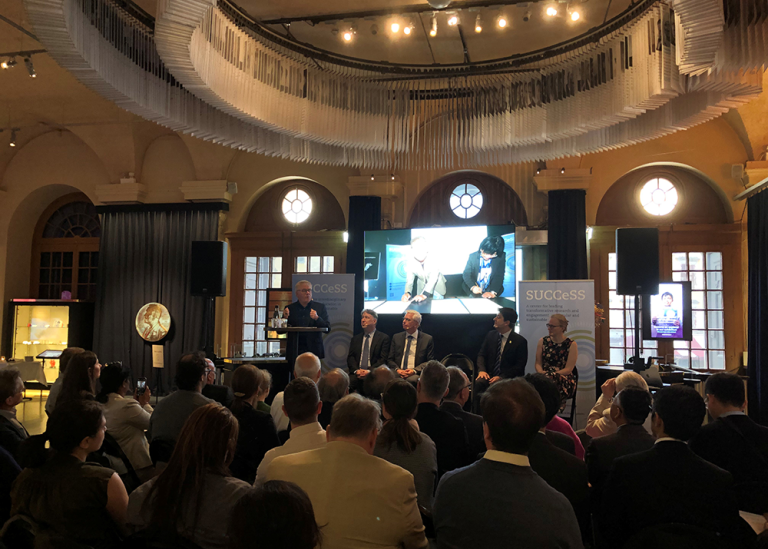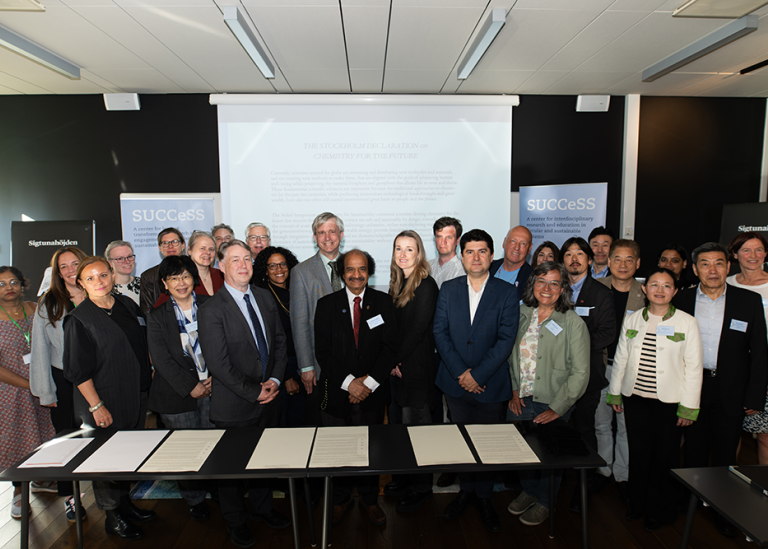Stockholm Declaration on Chemistry for the Future launched during the Nobel Symposium

The event held at the Nobel Prize Museum in central Stockholm also welcomed representatives from embassies, industry, public authorities, NGOs and media. The driving force behind the declaration was Paul Anastas, professor of chemistry at Yale University and senior advisor at SUCCeSS (also referred to as the "Father of Green Chemistry”). He solemnly read the full document in the beautiful museum building, adding “extraordinary events shall be held at extra ordinary places”.
The declaration
The Stockholm Declaration on Chemistry for the Future stresses that chemistry is – and has been – vital to advancing human well-being. But at the same time, chemistry has caused unintentional harm to people and the planet.
The declaration states that there is need to ensure that chemical products are safe and sustainable to eliminate waste by full material/ energy utilization, utilizing non-depleting materials, creating integrative systems etc.
Five essential elements are listed to make this transformation:
- The goals of reducing or eliminating harm to people and the planet must be integrated in chemical products and processes.
- There is need to act now. Inaction and status quo are more dangerous for people and the planet than transition.
- Teachers, students and practitioners of chemistry need to be trained to integrate health and sustainability in their work.
- Chemical data and information must be fully available and accessible to all. There is need for transparency.
- Government policies on the chemical enterprise must be aligned with sustainability and health.
The declaration also contains a call to action, urging scientists, industry, educators, students and policy makers to collaborate on implementing solutions for human well-being while preserving and protecting the environment:
By embracing this vision, we can harness chemistry´s full potential as a catalyst for a fairer, more sustainable, and resilient world", states the document.
Students, important for the transition
The reading of the declaration was followed by statements from four of the signatories. One of them is Ben Feringa, Nobel laureate in chemistry 2016 and professor at University of Groningen. He stressed the need to start with the students in chemistry to make a better, more sustainable world: “We have the power to change chemistry for the futures!”

Javier García Martínez, professor of inorganic chemistry at the University of Alicante, talked about the need to make chemistry sustainable and usable, but also about the economic gains of transforming to more sustainable chemistry. He also touched upon how research is questioned in certain countries and the need to embrace diversity within chemistry.
Helen Sneddon, professor of sustainable chemistry at University of York, talked about how chemistry has improved life of many people. But chemists have not been successful enough in telling these stories. By moving in the direction of more sustainable chemistry, it will be easier for industry to attract employees and make customers buy their products.
Walter Leitner, professor and director of the Max Planck Institute for Chemical Energy Conversion, talked about chemistry as “driving” the Anthropocene: “This document can only be read in one way – as a call to action.”
John Warner, American chemist, educator and entrepreneur, stressed the role of teaching students in chemistry about sustainability, otherwise today´s problem will prevail in the future.
The organisation of the Symposium was an important milestone for SUCCeSS. We are proud to be closely connected to this important declaration, which will have a large impact on re-inventing chemistry towards a sustainable future," says Berit Olofsson, Deputy Director of SUCCeSS (Stockholm University Center for Circular and Sustainable Systems) and Professor of Organic Chemistry.
The Stockholm Declaration on Chemistry for the Future welcomes scientists and others working in chemistry to read, sign and spread the declaration.
List photo by Liisa Eelsoo: Professor Paul Anastas with the signed Stockholm Declaration on Chemistry for the Future
Latest Highlights:
University of Salzburg founds international Stefan Zweig centre
The “Health City of the Community of Madrid” coming to life with UAM
700 books for the library of the Université Amadou-Mahtar M'Bow in Dakar, offered by ULB
Social Media reshapes news consumption in Eastern Europe, new study finds
